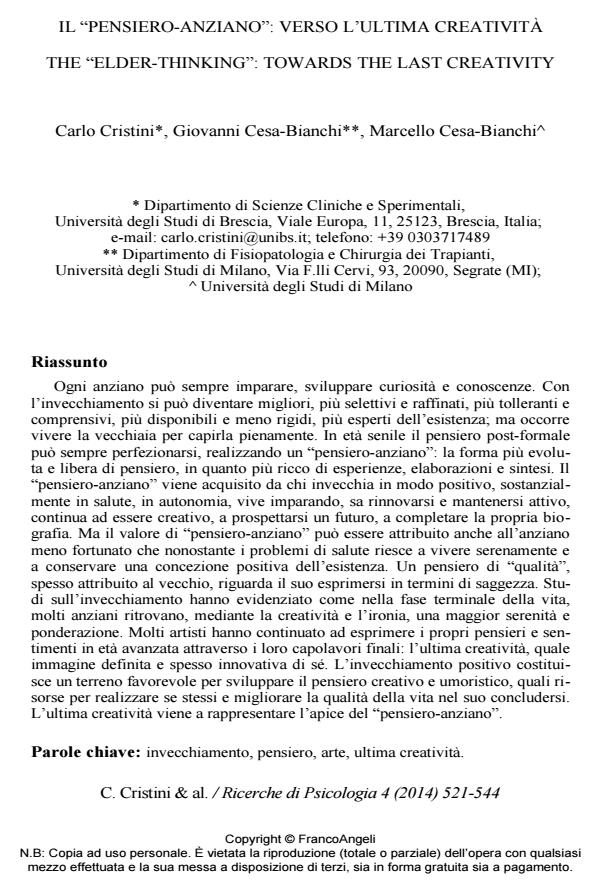The "elder-thinking": towards the last creativity
Journal title RICERCHE DI PSICOLOGIA
Author/s Carlo Cristini, Giovanni Cesa-Bianchi, Marcello Cesa-Bianchi
Publishing Year 2015 Issue 2014/4
Language Italian Pages 24 P. 521-544 File size 216 KB
DOI 10.3280/RIP2014-004001
DOI is like a bar code for intellectual property: to have more infomation
click here
Below, you can see the article first page
If you want to buy this article in PDF format, you can do it, following the instructions to buy download credits

FrancoAngeli is member of Publishers International Linking Association, Inc (PILA), a not-for-profit association which run the CrossRef service enabling links to and from online scholarly content.
Elderly people may always learn and increase curiosity and knowledge. In aging individuals may become better, more selective and refined, more tolerant, less rigid and more expert on existence; but we must live old age, to understand it very well. During the old age, post-formal thinking may always improve, creating an "elder-thinking": the most evolved and free way of thought, as richer experiences, processing and synthesis. The "elder-thinking" is acquired by those who grow old in a positive way, substantially in health, autonomy, live learning, know renew and keep themselves active, continue to be creative, to imagining a future, to complete their biography. But the value of "elder-thinking" may be also recognised by the less fortunate elderly who despite the health problems may live peacefully, to keep a positive conception of existence. A qualified thought, often given to the old, concerns its expression in terms of wisdom. Aging studies showed that in later life many people find greater serenity and reflection thanks to creativity and irony. In old age many artists have continued to express their thoughts and feelings in their final masterpieces: it could calls the ultimate creativity, as innovative and defined image of themselves. Positive aging is a good field for developing creative and humorous thought, as a resources to realize oneself and improve quality of life until the end. The last creativity represents the height of "elder- thinking".
Keywords: Aging, thinking, art, last creativity
- Carlo Cristini: un ricordo a pi&ugrav Alessandro Antonietti, Carlo Cipolli, Rossana De Beni, Anna Maria Della Vedova, Santo Di Nuovo, Mario Fulcheri, Gianbattista Guerrini, Luciano Peirone, Alessandro Porro, Pietro Vigorelli, in RICERCHE DI PSICOLOGIA 4/2022 pp.1
DOI: 10.3280/rip2021oa13098
Carlo Cristini, Giovanni Cesa-Bianchi, Marcello Cesa-Bianchi, Il "pensiero-anziano": verso l’ultima creatività in "RICERCHE DI PSICOLOGIA " 4/2014, pp 521-544, DOI: 10.3280/RIP2014-004001